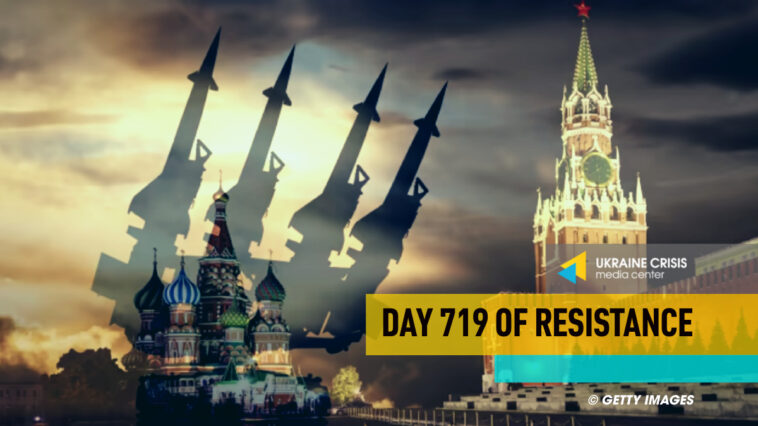Russia sends well-trained regular forces to storm Avdiyivka. Polish farmers extend Ukraine border blockade, stage protests near three more border crossings. Russia globally perceived as less of a threat compared to 2022, a survey finds.
Russia sends well-trained regular forces to storm Avdiyivka
In the Avdiyivka direction, Ukrainian troops are fighting off Russian special forces and paratroopers. In the past days, Russia has deployed more armored vehicles in its offensive operations, spokesperson for Ukraine’s defense forces in the Tavria direction, Dmytro Lykhoviy said in televised comments.
“The enemy’s intentions are clear to us. We see where they try to advance to sever a supply artery to Avdiyivka, in the first place, and create an operational encirclement,” he said, adding that Ukrainian troops are “countering these attempts. There are combat engagements. The contact line is moving both ways.”
“In the past days, the enemy started to deploy armored vehicles for the offensive, including tanks and infantry fighting vehicles. Sometimes there are one or two pieces, and at other times more than that,” Lykhoviy said. Russia previously used the tactics of small assault infantry groups, he added.
Polish farmers extend Ukraine border blockade, stage protests near three more crossings
Polish farmers started to protest near the Zosin-Ustyluh border crossing point and blocked two other crossings — Uhryniv-Dołhobyczów and Shehyni-Medyka, Ukraine’s State Border Guard Service said on Monday.
Protesters at the Zosin-Ustyluh crossing plan to allow only three trucks to pass every hour. Passenger cars, buses, vehicles carrying humanitarian and military help, and vehicles with a total gross weight under 3.5 tons will be let through in both directions.
At the Uhryniv-Dołhobyczów border crossing, protesters plan to allow two trucks to pass every hour in both directions.
“[Protesters] have also renewed the blockade of the Medyka-Shehyni border crossing point. They plan to allow one truck to pass every hour. The protest will not target passenger cars and buses,” the State Border Guard Service of Ukraine said.
Russia globally perceived as less of a threat compared to 2022, survey finds
Russia’s war against Ukraine is seen as less of a threat to the world than it was last year. That’s according to the 2024 Munich Security Index, new research published Monday ahead of the Munich Security Conference.
The survey provides an in-depth view of how people in 12 countries view 32 major global and domestic risks, and how these views change over time.
The Munich Security Index is based on surveys of around 1,000 people per country, initially conducted in the G7 and BRICS countries. Since last year, Ukraine is surveyed instead of Russia. The survey was undertaken in October and November last year by reputable local pollsters. The margin of error is 3.1 percentage points.
Almost all indicators related to Russia’s war on Ukraine have fallen, compared to late 2022 when data reflected in the previous edition of the survey was being collected.
Last year, Russia was perceived as the top threat by five G7 countries. This year, it is perceived as the number one threat only in the UK and Japan. In the 2024 report, Russia has slipped back to seventh place in Germany, sixth place in France, and 12th place in Italy.
The pattern is replicated across the G7 group of countries — the threat posed by Russia was cited as the top concern in surveys conducted in late 2022 for the 2023 Munich Security Index, but has dropped to fourth overall a year later.
Concern about mass migration as a result of war or climate change, and radical Islamic terrorism is now high on the list of threats in Europe and North America.
Worries of mass migration and terrorism now sit at number one in Germany and France, and rank second in Italy, preceded by climate change.
The threat of Iran has also risen significantly in the risk index among the G7 countries. Cyberattacks now rank as the top concern in the U.S., followed by political polarization and the threat of China.
In all countries bar the U.S., at least one of the three environmental threats covered by the index features in the top three, the report reads.
In the so-called BRICS — Brazil, Russia, India, China and South Africa, perception of Russia and Iran has not changed, and views of China have improved.
Why Sanctions on the Moscow Patriarchate Aren’t Religious Persecution. Ukraine in Flames #571
Ukrainian clergy of the Moscow Patriarchate continue contacting, traveling, and receiving instructions from their Russian supervisors and implement these instructions through the Church, deliver those messages to the population and spread pro-Russian hostile narratives. 78% of Ukrainians believe that the state should somehow intervene in the activities of the Ukrainian Orthodox Church of the Moscow Patriarchate. Watch Ukraine in flames #571 to find out why sanctions against the Moscow Patriarchate in Ukraine aren’t religious persecution, and how UOC MP has been shaping narratives in Ukraine beneficial to the aggressor country.
Guests:
- Andriy Bondar, Ukrainian writer, publicist and translator
- Ihor Stokoz, Public Activist
- Yuriy Lukanov, Ukrainian journalist and writer




